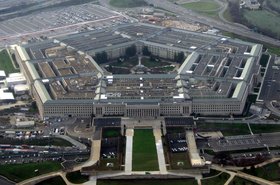The US government has extended its ongoing ban on US companies working with Huawei, and unveiled further restrictions aimed at impacting semiconductor manufacturing.
The move, which follows TSMC's announcement that it would build a massive chip plant in the US, has been met with consternation by Chinese officials, with rumors swirling that retaliatory restrictions against US tech companies are planned.
“Survival is the keyword for us at present"
In addition to the existing restrictions on US firms working with Huawei, the Bureau of Industry and Security at the Commerce Department said that it would specifically target semiconductor and chipset designs.
This covers anything that is the direct product of certain US Commerce Control List (CCL) software and technology or CCL semiconductor manufacturing equipment located outside the United States.
The ban is thought to have impacted Taiwan Semiconductor Manufacturing Co, the largest third-party chip manufacturer, Nikkei reports.
The company is finishing existing orders with Huawei, its second largest client, but will reportedly drop the Chinese giant - worth 15-20 percent of its revenue - once it has fulfilled its contractual obligations.
Last week, TSMC announced plans to build a $12bn Arizona semiconductor foundry, with the backing of what are thought to be generous state subsidies.
“Despite the Entity List actions the Department took last year, Huawei and its foreign affiliates have stepped-up efforts to undermine these national security-based restrictions through an indigenization effort. However, that effort is still dependent on U.S. technologies,” Secretary of Commerce Wilbur Ross said.
“This is not how a responsible global corporate citizen behaves. We must amend our rules exploited by Huawei and HiSilicon and prevent US technologies from enabling malign activities contrary to US national security and foreign policy interests.”
The US claims that Huawei evaded US sanctions on Iran, and acts as an arm of the Chinese state, allegations that the company has repeatedly denied.
In a long-planned conference held today, 18 May, Huawei’s rotating chairman Guong Ping commented on the US government's recent move, admitting "survival is the keyword for us at present."
He continued: "Over the past year, many technologies became unavailable to us. Despite this, Huawei struggled to survive and is striving to move forward."
Ping said that "globalization shouldn't and will not likely be reversed. Fragmented standards and supply chains benefit no one, and further fragmentation will have a severe impact on the entire industry."
The company canceled a planned post-conference media Q&A.
Over the weekend, China’s foreign ministry said that the US needed to stop the “unreasonable suppression” of Chinese companies like Huawei, while the state-owned Global Times newspaper quoted a source close to the Chinese government as saying that Beijing was ready to retaliate, including potentially creating an “unreliable entity list” and imposing restrictions on companies such as Apple, Cisco, and Qualcomm.
"China will take forceful countermeasures to protect its own legitimate rights," the source said.
Another 'insider' is quoted in the government-approved publication as saying "China will launch rounds of endless investigations on those firms, just like swords hanging over their head. It will dampen investors' confidence and squeeze their income in the Chinese market."
After an extensive and painful trade war, it had appeared that the US and China were set to improve relations with a tentative January trade deal. But such efforts quickly fell apart as the Covid-19 pandemic exacerbated tensions, with corroborated reports that the Chinese government suppressed information on the virus, and uncorroborated and unlikely US claims that the virus was made in a lab.
As President Trump faces a difficult reelection campaign amid mounting deaths and a crashing economy, attacking China is thought to be key to his election strategy.





